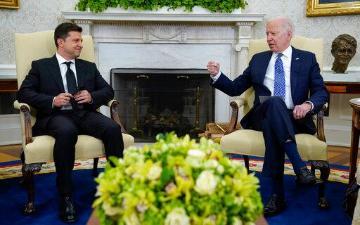
Ann Skeet (@leaderethics) is the senior director of leadership ethics at the Markkula Center for Applied Ethics. Views are her own.
The Ukrainian war presents leaders with an untenable choice: genocide of the country’s people or armed conflict potentially on a scale unseen since World War II. Government leaders are proceeding carefully, attempting to use established norms for diplomacy and combat escalation. In doing so, leaders are playing their position relentlessly, with disciplined focus on the specific interests they are charged to represent.
Leaders are making nuanced and critical ethical decisions. President Volodymyr Zelenksyy is a leader willing to suffer with his people, his solidarity stirring in them a ferocious effort to protect their country and its democracy. He has asked for a no-fly zone for his people’s protection, which might expand the conflict if Russia violates it, an expected response. By asking for it, he is playing his position as protector and advocator for his people, victims of Russian military choices so vile as to be considered war crimes. Since his request was not granted, he has withdrawn his request to join NATO. Now considering talks with Russia about separatist regions, Zelenksyy said, “What is important to me is how the people in those territories are going to live who want to be part of Ukraine, who in Ukraine will say they want to have them in,” still focusing on the needs of all the Ukrainian people.
President Joe Biden’s response to the no-fly zone request was to resist it. This might seem inhumane, but his responsibility is protecting American interests. Expanding the conflict in Europe increases the likelihood of increased military engagement, which can cost American lives, and create economic and geopolitical fallout that accompanies large-scale war. Following a Trump administration that eroded U.S. democratic norms, Biden must also restore civil discourse, the rule of law, and the confidence of U.S. allies, including NATO.
NATO leaders are moving carefully to protect and honor the collective decision making that such alliances require. One premise of NATO is a commitment to the peaceful resolution of conflicts. Though the moment for that has passed for Ukrainians, NATO’s leaders are demonstrating a good faith commitment to diplomacy wherever possible. This will strengthen their moral authority if they decide, at some future point, to move past diplomatic efforts.
German Chancellor Olaf Scholz has shifted his country’s policy towards Russia dramatically in a few short weeks. While committed to diplomacy, he is also arming his country and weaning it from Russian sources of energy. EU regulators are strengthening sanctions against Russia and Belarus, while upholding energy markets for Europeans.
Throughout these choices, the ethics of care are at play. Each leader is balancing the primary interests they serve and the commitments that have been made, on behalf of those interests, to alliances like NATO and the EU. It is a moment in history when relationships matter deeply.
Individuals are making personal choices centered on some of these same tradeoffs. How do I prioritize taking care of myself and my family versus meeting a collective call to protect my country? Ukrainian leaders helped make this choice, requiring men to stay and protect the country, permitting women to leave and care for children.
The global response to the plight of the Ukrainian people is grounded in commitment to fundamental human rights. Diplomats and NATO leaders are running a utilitarian calculus, pursuing diplomacy and defense simultaneously. Business leaders are prioritizing the common good over corporate short-term profits. As with Covid, the world is running a real-time ethics simulation. Only it’s real.
NATO was established in 1949. Twenty-two years ago, the United Nations articulated Sustainable Development Goals for the world and a global compact for corporate sustainability. The World Economic Forum has existed for 50 years. The Business Roundtable updated its statement of business purpose three years ago to express commitment to stakeholders beyond investors. At any point in time, each of these institutions have been criticized for providing mere lip service. Individual leaders have been called out for acting in ways that conflict with the stated principles and goals of their institutions. I’m thinking, for example, about private jets flying into Davos so people can discuss climate change. These criticisms by followers are valid and necessary as they, too, contribute to change.
The imperfections of human beings serving in leadership roles is something we must bear. Discourse over many years is something leaders invest in, knowing full well the fruits of those discussions will not be realized for many generations. It is worthwhile to suffer the imperfections and engage in the dialogue. It has helped leaders to act now, to change as people and as leaders, to have clarity about what they are responsible for and accept that responsibility. This is the heart of ethical leadership.
